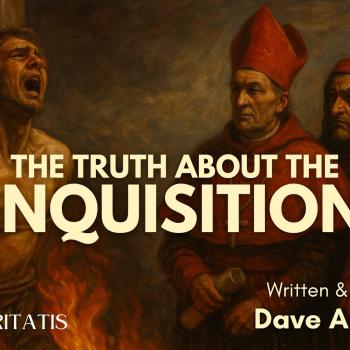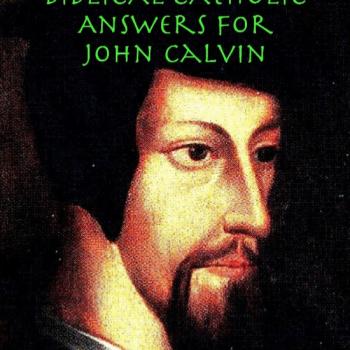This is an installment of a series of replies (see the Introduction and Master List) to much of Book IV (Of the Holy Catholic Church) of Institutes of the Christian Religion, by early Protestant leader John Calvin (1509-1564). I utilize the public domain translation of Henry Beveridge, dated 1845, from the 1559 edition in Latin; available online. Calvin’s words will be in blue. All biblical citations (in my portions) will be from RSV unless otherwise noted.
Related reading from yours truly:
Biblical Catholic Answers for John Calvin (2010 book: 388 pages)
A Biblical Critique of Calvinism (2012 book: 178 pages)
Biblical Catholic Salvation: “Faith Working Through Love” (2010 book: 187 pages; includes biblical critiques of all five points of “TULIP”)
*****
IV, 1:13-17
***
CHAPTER 1.
OF THE TRUE CHURCH. DUTY OF CULTIVATING UNITY WITH HER, AS THE MOTHER OF ALL THE GODLY.
13. The immoral lives of certain professors no ground for abandoning the Church. Error on this head of the ancient and modern Cathari. Their first objection. Answer to it from three of our Saviour’s parables.
Our indulgence ought to extend much farther in tolerating imperfection of conduct. Here there is great danger of falling, and Satan employs all his machinations to ensnare us. For there always have been persons who, imbued with a false persuasion of absolute holiness, as if they had already become a kind of aërial spirits, spurn the society of all in whom they see that something human still remains.
This is a marvelously apt, on-target description of a particular corruption of certain notorious Christian sinners, along the lines of self-righteousness and condescension towards others. Ironically, the ones perhaps most infamous for this are often self-proclaimed followers of Calvin, who have become hyper-legalistic and downright Pharisaical. We must give Calvin credit and thank him for denouncing such things, and quote him against those of his followers who don’t yet get it.
Such of old were the Cathari and the Donatists, who were similarly infatuated. Such in the present day are some of the Anabaptists, who would be thought to have made superior progress. Others, again, sin in this respect, not so much from that insane pride as from inconsiderate zeal. Seeing that among those to whom the gospel is preached, the fruit produced is not in accordance with the doctrine, they forthwith conclude that there no church exists. The offence is indeed well founded, and it is one to which in this most unhappy age we give far too much occasion. It is impossible to excuse our accursed sluggishness, which the Lord will not leave unpunished, as he is already beginning sharply to chastise us. Woe then to us who, by our dissolute licence of wickedness, cause weak consciences to be wounded!
Sin among Christians is always a cause of scandal, and this is how it should be. But we cannot conclude from this that “no church exists.”
Still those of whom we have spoken sin in their turn, by not knowing how to set bounds to their offence. For where the Lord requires mercy they omit it, and give themselves up to immoderate severity. Thinking there is no church where there is not complete purity and integrity of conduct, they, through hatred of wickedness, withdraw from a genuine church, while they think they are shunning the company of the ungodly. They allege that the Church of God is holy. But that they may at the same time understand that it contains a mixture of good and bad, let them hear from the lips of our Saviour that parable in which he compares the Church to a net in which all kinds of fishes are taken, but not separated until they are brought ashore. Let them hear it compared to a field which, planted with good seed, is by the fraud of an enemy mingled with tares, and is not freed of them until the harvest is brought into the barn. Let them hear, in fine, that it is a thrashing-floor in which the collected wheat lies concealed under the chaff, until, cleansed by the fanners and the sieve, it is at length laid up in the granary. If the Lord declares that the Church will labour under the defect of being burdened with a multitude of wicked until the day of judgment, it is in vain to look for a church altogether free from blemish Mt. 13).
Again, Calvin offers a fabulous biblical condemnation of the naive, self-righteous idea that there will never be any sinners in the Church at all. Bravo!
14. Second objection. Answer from a consideration of the state of the Corinthian Church, and the Churches of Galatia.
They exclaim that it is impossible to tolerate the vice which everywhere stalks abroad like a pestilence. What if the apostle’s sentiment applies here also? Among the Corinthians it was not a few that erred, but almost the whole body had become tainted; there was not one species of sin merely, but a multitude, and those not trivial errors, but some of them execrable crimes. There was not only corruption in manners, but also in doctrine. What course was taken by the holy apostle, in other words, by the organ of the heavenly Spirit, by whose testimony the Church stands and falls? Does he seek separation from them? Does he discard them from the kingdom of Christ? Does he strike them with the thunder of a final anathema? He not only does none of these things, but he acknowledges and heralds them as a Church of Christ, and a society of saints. If the Church remains among the Corinthians, where envyings, divisions, and contentions rage; where quarrels, lawsuits, and avarice prevail; where a crime, which even the Gentiles would execrate, is openly approved; where the name of Paul, whom they ought to have honoured as a father, is petulantly assailed; where some hold the resurrection of the dead in derision, though with it the whole gospel must fall; where the gifts of God are made subservient to ambition, not to charity; where many things are done neither decently nor in order: If there the Church still remains, simply because the ministration of word and sacrament is not rejected, who will presume to deny the title of church to those to whom a tenth part of these crimes cannot be imputed? How, I ask, would those who act so morosely against present churches have acted to the Galatians, who had done all but abandon the gospel (Gal. 1:6), and yet among them the same apostle found churches?
I think this is exactly right, and I have often made the same argument, citing the Galatians, Corinthians, and seven churches in the book of Revelation. Especially noteworthy is Calvin’s pointing out how St. Paul reacted to these scandals: “Does he seek separation from them? Does he discard them from the kingdom of Christ?”
They also object, that Paul sharply rebukes the Corinthians for permitting an heinous offender in their communion, and then lays down a general sentence, by which he declares it unlawful even to eat bread with a man of impure life (1 Cor. 5:11, 12). Here they exclaim, If it is not lawful to eat ordinary bread, how can it be lawful to eat the Lord’s bread? I admit, that it is a great disgrace if dogs and swine are admitted among the children of God; much more, if the sacred body of Christ is prostituted to them. And, indeed, when churches are well regulated, they will not bear the wicked in their bosom, nor will they admit the worthy and unworthy indiscriminately to that sacred feast. But because pastors are not always sedulously vigilant, are sometimes also more indulgent than they ought, or are prevented from acting so strictly as they could wish; the consequence is, that even the openly wicked are not always excluded from the fellowship of the saints. This I admit to be a vice, and I have no wish to extenuate it, seeing that Paul sharply rebukes it in the Corinthians. But although the Church fail in her duty, it does not therefore follow that every private individual is to decide the question of separation for himself.
Catholics agree again. We merely point out the obvious: that the last sentence is contrary to both Protestant private judgment and to the behavior of those, like Calvin, who themselves decided to separate from the historic Christian Catholic Church.
I deny not that it is the duty of a pious man to withdraw from all private intercourse with the wicked, and not entangle himself with them by any voluntary tie; but it is one thing to shun the society of the wicked, and another to renounce the communion of the Church through hatred of them.
Excellent point, and important distinction between the public and private realms . . .
Those who think it sacrilege to partake the Lord’s bread with the wicked, are in this more rigid than Paul.
I love Calvin’s emphasis on comparison with the Apostle Paul, who told us more than once to imitate him.
For when he exhorts us to pure and holy communion, he does not require that we should examine others, or that every one should examine the whole church, but that each should examine himself (1 Cor. 11:28, 29).
Excellent . . .
If it were unlawful to communicate with the unworthy, Paul would certainly have ordered us to take heed that there were no individual in the whole body by whose impurity we might be defiled, but now that he only requires each to examine himself, he shows that it does no harm to us though some who are unworthy present themselves along with us. To the same effect he afterwards adds, “He that eateth and drinketh unworthily, eateth and drinketh damnation to himself.” He says not to others, but to himself. And justly; for the right of admitting or excluding ought not to be left to the decision of individuals. Cognisance of this point, which cannot be exercised without due order, as shall afterwards be more fully shown, belongs to the whole church. It would therefore be unjust to hold any private individual as polluted by the unworthiness of another, whom he neither can nor ought to keep back from communion.
This is a much-needed emphasis on Church authority and a corporate (biblical) approach to Christianity, that should be required reading for all Protestants.
Still, however, even the good
Many Calvinists today and some other Protestants wouldn’t speak in terms of a “good person.” They would immediately retort that we are all sinners, with no good in us. I’ve engaged in debates with people (followers of Calvin) who think exactly like that. But Calvin didn’t.
are sometimes affected by this inconsiderate zeal for righteousness, though we shall find that this excessive moroseness is more the result of pride and a false idea of sanctity, than genuine sanctity itself, and true zeal for it.
A better description of the essential wrongheadedness and harmfulness of both “puritanism” and fundamentalism (in the derogatory sense of both words) has probably never been given.
Accordingly, those who are the most forward, and, as it were, leaders in producing revolt from the Church, have, for the most part, no other motive than to display their own superiority by despising all other men.
Another true observation, but would that Calvin would take his own advice and apply it to how he views Catholics!
Well and wisely, therefore, does Augustine say, “Seeing that pious reason and the mode of ecclesiastical discipline ought specially to regard the unity of the Spirit in the bond of peace, which the Apostle enjoins us to keep, by bearing with one another (for if we keep it not, the application of medicine is not only superfluous, but pernicious, and therefore proves to be no medicine); those bad sons who, not from hatred of other men’s iniquities, but zeal for their own contentions, attempt altogether to draw away, or at least to divide, weak brethren ensnared by the glare of their name, while swollen with pride, stuffed with petulance, insidiously calumnious, and turbulently seditious, use the cloak of a rigorous severity, that they may not seem devoid of the light of truth, and pervert to sacrilegious schism, and purposes of excision, those things which are enjoined in the Holy Scriptures (due regard being had to sincere love, and the unity of peace), to correct a brother’s faults by the appliance of a moderate cure” (August. Cont. Parmen. cap. 1).
A better description of the essential wrongheadedness and harmfulness of the Protestant Revolt against the Catholic Church and doctrinal tradition has probably never been given. How ironic that Calvin cites it, and how tragic that he seems to have no inkling of how this criticism could quite accurately be applied to his own schismatic movement. But those things never seem to enter his head: so sure is he of his own rightness.
To the pious and placid his advice is, mercifully to correct what they can, and to bear patiently with what they cannot correct, in love lamenting and mourning until God either reform or correct, or at the harvest root up the tares, and scatter the chaff (Ibid. cap. 2). Let all the godly study to provide themselves with these weapons, lest, while they deem themselves strenuous and ardent defenders of righteousness, they revolt from the kingdom of heaven, which is the only kingdom of righteousness. For as God has been pleased that the communion of his Church shall be maintained in this external society, any one who, from hatred of the ungodly, violates the bond of this society, enters on a downward course, in which he incurs great danger of cutting himself off from the communion of saints. Let them reflect, that in a numerous body there are several who may escape their notice, and yet are truly righteous and innocent in the eyes of the Lord. Let them reflect, that of those who seem diseased, there are many who are far from taking pleasure or flattering themselves in their faults, and who, ever and anon aroused by a serious fear of the Lord, aspire to greater integrity. Let them reflect, that they have no right to pass judgment on a man for one act, since the holiest sometimes make the most grievous fall. Let them reflect, that in the ministry of the word and participation of the sacraments, the power to collect the Church is too great to be deprived of all its efficacy, by the fault of some ungodly men. Lastly, let them reflect, that in estimating the Church, divine is of more force than human judgment.
I think this is an extraordinarily eloquent and wise observation: flawed only insofar as (I hate to keep repeating this) it is not applied with consistency to his own party of dissidents from Catholicism. This is a general irony and tragedy of Protestant rationales: what is said of the “radical” Protestant factions and sectarians can usually just as easily be applied from a Catholic and historical perspective to the so-called “magisterial reformers” or “mainstream Reformation.” We contend that the difference is only one of degree, not of essence.
Since they also argue that there is good reason for the Church being called holy, it is necessary to consider what the holiness is in which it excels, lest by refusing to acknowledge any church, save one that is completely perfect, we leave no church at all. It is true, indeed, as Paul says, that Christ “loved the church, and gave himself for it, that he might sanctify and cleanse it with the washing of water by the word, that he might present it to himself a glorious church, not having spot, or wrinkle, or any such thing; but that it should be holy and without blemish” (Eph. 5:25-27). Nevertheless, it is true, that the Lord is daily smoothing its wrinkles, and wiping away its spots.
Very true . . .
Hence it follows, that its holiness is not yet perfect. Such, then, is the holiness of the Church: it makes daily progress, but is not yet perfect; it daily advances, but as yet has not reached the goal, as will elsewhere be more fully explained.
And this is true also of any individual Christian desiring to grow in grace and sanctification as time goes on.
Therefore, when the Prophets foretel, “Then shall Jerusalem be holy, and there shall no strangers pass through her any more;”—“It shall be called, The way of holiness; the unclean shall not pass over it” (Joel 3:17; Isa. 35:8), let us not understand it as if no blemish remained in the members of the Church: but only that with their whole heart they aspire after holiness and perfect purity: and hence, that purity which they have not yet fully attained is, by the kindness of God, attributed to them. And though the indications of such a kind of holiness existing among men are too rare, we must understand, that at no period since the world began has the Lord been without his Church, nor ever shall be till the final consummation of all things. For although, at the very outset, the whole human race was vitiated and corrupted by the sin of Adam, yet of this kind of polluted mass he always sanctifies some vessels to honour, that no age may be left without experience of his mercy. This he has declared by sure promises, such as the following: “I have made a covenant with my chosen, I have sworn unto David my servant, Thy seed will I establish for ever, and build up thy throne to all generations” (Ps. 89:3, 4). “The Lord hath chosen Zion; he hath desired it for his habitation. This is my rest for ever; here will I dwell” (Ps. 132:13, 14). “Thus saith the Lord, which giveth the sun for a light by day, and the ordinances of the moon and of the stars for a light by night, which divideth the sea when the waves thereof roar; The Lord of hosts is his name: If those ordinances depart from before me, saith the Lord, then the seed of Israel also shall cease from being a nation before me for ever” (Jer. 31:35, 36).
This is reasonable. Calvin again makes an analogy of the Church to the chosen people. Like them, the Church is what it is wholly because of God and His purposes for it, not because all of us in it are shining examples of sainthood and perfect nobility of character and conduct. There is much in the Institutes (at least in these sections thus far) that Catholics can agree with, as I have already noted many times, and will be delighted to keep noting as I proceed.
***
(originally 4-29-09; rev. 12-17-18)
Photo credit: Historical mixed media figure of John Calvin produced by artist/historian George S. Stuart and photographed by Peter d’Aprix: from the George S. Stuart Gallery of Historical Figures archive [Wikimedia Commons / Creative Commons Attribution-Share Alike 3.0 Unported license]
***













